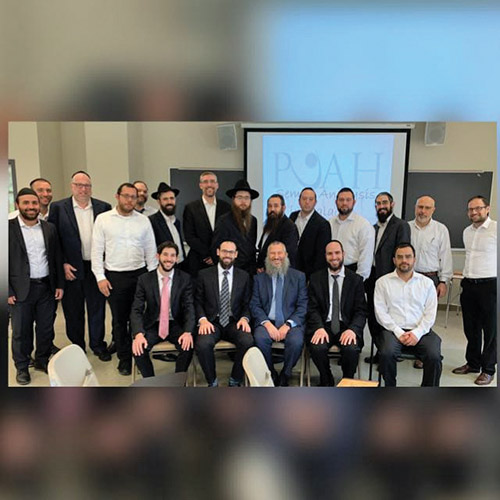
(Courtesy of PUAH) Put 18 pulpit rabbis in one room for a week and what do you get?
While this sounds like a good opening line for a drasha, (and you’re probably already inserting your favorite rabbi joke here), the 18 rabbanim who gathered last week for PUAH’s advanced seminar on taharat hamishpacha and infertility came away with their own answer: An intensive education in a highly relevant and specialized area of halacha, and a priceless new network of rabbinic colleagues to collaborate with.
Answering taharat hamishpacha questions is the bread and butter of a shul rabbi’s job. Yet the laws, which are intricate to begin with, become extremely complex once you enter the arena of infertility. With 1 in 6 couples experiencing some form of infertility, chances are high that a rabbi will be approached by his congregant for guidance in this area. It’s therefore vital for every rabbi to learn these halachot; however, your average shul rabbi does not have the requisite medical knowledge nor in-depth familiarity with the specialized halachic responsa.
Enter PUAH. For 30 years, PUAH has been at the forefront of fertility medicine and halacha. PUAH’s rabbinic advisers are the world’s leading experts in the field; this is our bread and butter. And part of PUAH’s educational mission is to train shul rabbis in this specialized area of halacha—so that they can most effectively guide you, their congregant.
July’s intensive four-day seminar, given by Rabbi Gideon Weitzman, PUAH senior adviser, included lectures on the topics of IVF, IUI, surrogacy and more, and the relevant laws of taharat hamishpacha as they apply to these medical treatments and technologies. Arranged by Rabbi Elan Segelman, rabbinic head of PUAH-U.S., every detail was perfectly coordinated—from the location in Beis Medrash L’Torah, Lander’s College for Men in Kew Gardens Hills, New York, to the delicious, restaurant-catered lunches.
But for the rabbinic participants, the real excitement was in getting to meet and interact with their colleagues. These rabbanim represented a gamut of locations and cultural groups within Orthodox Judaism; they hailed from as close as Queens and as far as South Carolina and Jacksonville. They were Ashkenazim, Sefardim, Bucharians and Chabad. Each had their own experiences in dealing with couples in their communities; each had valuable knowledge to share; and the dynamic exchanges during the classes as well as the breaks gave a charged, high-energy feel to the entire seminar.
To capitalize on this energy, Rabbi Segelman set up a WhatsApp group for all the participants, and the rabbanim have since been sharing she’eilot and teshuvot that arise in the course of their counseling. Having a network of fellow rabbis to consult with is an invaluable side benefit that they received from the conference.
But most significantly, as a result of the seminar, 18 new shuls throughout the country now have rabbinic leaders who are trained to provide proper halachic guidance about fertility treatment.










